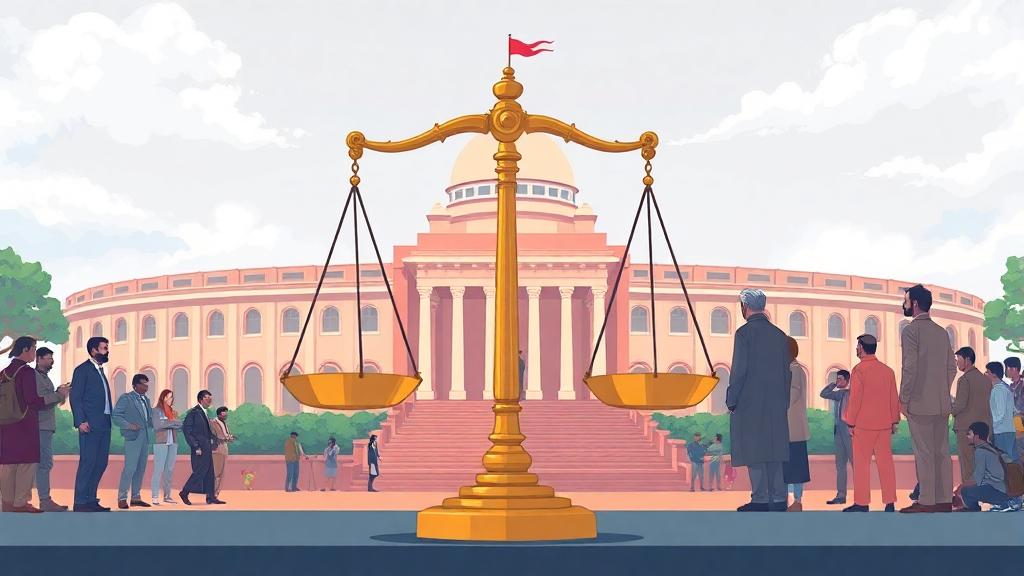
First, what is this Waqf thing?
Okay, before getting into the latest drama, let’s just understand what Waqf even means. It’s a kind of donation system in Islam — usually land, buildings, or anything valuable — that’s given away forever for religious or charity work. Think of land used for masjid, orphan homes, madrasas, clinics, even burial grounds. And these are not one-two pieces of land. We’re talking over 6 lakh Waqf properties across India. Valued in lakhs of crores.
Now, Waqf Boards are supposed to manage all this. But over the years, things have gone all over the place. Too many fights over land, illegal takeovers, and in many places, complete mismanagement.
Waqf Law: Earlier vs Now — What’s Waqf Bill 2025 Really Changing?
Here’s how the new Waqf Bill is shifting things around, compared to the older Act from 1995:
1. Dispute Settlement
- Back then, if any fight happened over Waqf land, it went to Waqf Tribunals — a sort of special court. People had faith that legal steps would be followed.
- Now, such disputes will go to the District Collector. That means, instead of a judicial process, an administrative officer will decide. This worries many, because the legal filter is now missing.
2. Recognition of Waqf by Long Use
- Earlier, even if there were no official papers, land used for Waqf purposes for many years could still be recognised as Waqf. It was based on usage and tradition.
- Now, that won’t work. If the place isn’t registered properly with full documents, it will not be accepted as Waqf. That puts many old mosques and madrasas at risk of losing legal protection.
3. Who Conducts Surveys
- Earlier, surveys were done by officers appointed by the Waqf Board. These people usually had some understanding of local customs and religious use.
- From now, surveys will be carried out by district officials like Magistrates or Revenue staff. The concern is, they may not always understand the full background of the property.
4. Digital Records
- The old system didn’t really push for online databases. Many files were still physical — and often, incomplete or scattered.
- Now, it is compulsory to digitise all Waqf properties. This includes uploading documents and using geo-tagging. It sounds modern, but if older papers are missing, it could create confusion or loss.
5. Authority Over Land Decisions
- Before, Waqf Boards had more control in managing properties. They could look after decisions directly and guide through community members.
- Now, decision-making power is being shifted more towards local bureaucrats. It means less say for the Waqf Board itself.
6. Community Representation
- Earlier, there were voices from the Muslim community directly inside Waqf Boards. They could represent the people and raise real concerns.
- The new system seems to reduce that kind of involvement. There’s more centralised power, and less direct role for common citizens in Waqf matters.
Why So Much Protest?
Let’s be honest — it’s not just about rules. It’s about trust, and right now, there isn’t much.
- People feel targeted: Many in the Muslim community feel this law is like questioning their history and heritage. They say, “Our elders donated this land long ago. Now we need papers?”
- Old cases might come back: Imagine a masjid land from 1930. No one has full documents today. But now, that land can be reviewed again. People worry — what if it’s taken away?
- No more court-style justice: Replacing Tribunals with government officers doesn’t feel right to many. They say: What if an officer is biased? What if there’s pressure from above?
- Timing feels off: Some people are also pointing at the election season and asking — “Why now?” They feel it’s more about politics than reform.
So What’s the Real-World Impact Waqf Bill 2025?
This isn’t just about papers and files. Waqf properties fund schools, hospitals, orphanages. Small clinics in poor towns. Graveyards for those who can’t afford a plot. Remove that support and entire communities can suffer.
Take a small madarsa running in a village for 50 years. No formal deed, just usage. Now, it’s at risk. What happens to the kids studying there?
Is the Bill Completely Bad?
No, no. It’s not like that. Let’s be fair. Some parts actually make sense:
- Waqf Boards were messy. No proper data, no audits.
- Many fake claims were made on land by just saying “This is Waqf.”
- Tribunals were slow. Cases ran for 10-15 years.
- Now with digital records, maybe fewer scams.
So yes, cleaning the system is needed. But the way it’s being done? That’s what’s bothering people.
What the Government Committee Found
The Joint Parliamentary Committee had some interesting things to say:
- Many state Waqf Boards don’t even have working digital systems.
- Surveys were done so poorly that public land and Waqf land were overlapping.
- Some states had cases dragging for decades due to slow Tribunals.
The committee basically said — yes, clean the mess, but please talk to the people too.
Final Thoughts: What Common People Think Waqf Bill 2025
If you ask the average Indian citizen, many will say: “Fine, make things digital. Stop the misuse. But don’t take away rights without listening.”
Among Indian Muslims, there’s real fear. Losing protection for old properties just because a paper is missing? It feels like a loss of identity, not just land. Reform is okay, but forcefully pushing changes without involving people — that never ends well.
Leave a Reply